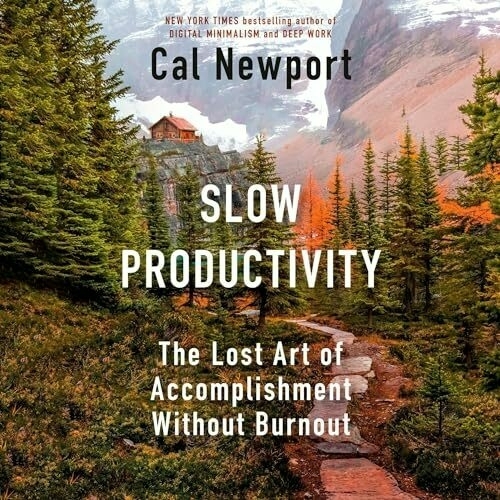Just enough capitalism – A quick review of Slow Productivity

Slow Productivity by Cal Newport 📚
Cal Newport’s latest advice book tackles the question of productivity in knowledge work. Factory work can much more easily be measured and systematized. Newport points out that office workers, writers, artists, and scholars are often assigned tasks and must come up with their own individual system to be productive. These systems are opaque to managers, who end up relying on “visible activity” (which many busy office workers are familiar with) as the proxy for productivity. Add in always-on email and instant messaging apps, plus a global pandemic and people trying to work from busy homes, and you end up with a lot of burnout.
The initial chapters of the book will have many knowledge workers nodding along empathetically, sharing in the sense of exhaustion and overload. Taking inspiration from the “slow food” movement Newport quickly moves into his three solutionary principles:
- Do fewer things
- Work at a natural pace
- Obsess over quality
Each principle gets its own chapter full of tips in how you can step out of the hamster wheel of “psuedo-productivity”, take back your time from your employer, and focus on truly great work. Newport takes a lot of inspiration from classic figures like Isaac Newton, Copernicus, and Madame Curie. (Pretty intimidating for your average cubicle warrior…)
Ultimately, the book is not interested in deeper, critical questions of why we are burning out. Despite calling for a “revolution” in the conclusion, Newton drops some snide comments about Marx and leftists in the text. Challenging the system is not his job. Perhaps expected of a “productivity” blogger, he remains very much imprisoned in the self-exploitative work camp of the “late-modern achievement-subject” (see The Burnout Society by philosopher Byung Chul Han, an overview and link to my review here).
Maybe I am being too “obsessed over quality.” A cynic might say this is a short book that capitalizes on people’s dissatisfaction with their work life and then doles “life-changing” advice between mentions of all his other books (on sale at all fine bookstores! And I admit I would like to get at least one more!). The advice basically boils down to: get really good at something, raise your rates, and lower the amount of time you spend engaging in capitalism. It is burnout mitigation on the level of a corporate mindfulness retreat. But that’s okay. It is better than nothing, and sometimes a reader needs a bit of prodding to be self-reflective, and the book did spur me to think about my own working habits. And though I have my issues, it is much better than other “make your bed”-style self-help books. I enjoyed the first bit and there are a few good nuggets in there. I think it would be a good jumping off point for discussion in a book club or office setting. So if you need something to spark a little rethinking about how you are doing things, this could be a good quick and moderately stimulating read. 3 stars!